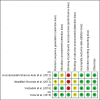Supplementation of Vitamin D in the Postdelivery Period of Women with Previous Gestational Diabetes Mellitus: Systematic Review and Meta-Analysis of Randomized Trials
- PMID: 34670305
- PMCID: PMC10183839
- DOI: 10.1055/s-0041-1734000
Supplementation of Vitamin D in the Postdelivery Period of Women with Previous Gestational Diabetes Mellitus: Systematic Review and Meta-Analysis of Randomized Trials
Abstract
Objective: To evaluate the effects of vitamin D supplementation in the postpartum period of women with previous gestational diabetes mellitus (GDM).
Methods: Randomized clinical trials of pregnant women with GDM of any chronological, gestational age and parity, with no history of previous disease who received vitamin D supplementation in the prenatal and/or postpartum period and were evaluated in the postpartum period were included. The PubMed, EMBASE, Cochrane, and LILACS databases were consulted until July 2019. Serum vitamin D concentration (25-hydroxyvitamin D in nmol/L), fasting blood glucose, glycated hemoglobin, serum calcium concentration, homeostatic model assessment of insulin resistance (HOMA-IR), quantitative insulin sensitivity check index (QUICKI), parathyroid hormone (PTH) and body mass index (BMI) were evaluated. Similar results in at least two trials were plotted using the RevMan 5; Cochrane Collaboration, Oxford, Reino Unido. The quality of the evidence was generated according to the classification, development, and evaluation of the classification of the recommendations.
Results: Four studies were included in the present review (200 women). The findings indicate that there is no difference in the postpartum period in women diagnosed with previous GDM who received vitamin D supplementation in the prenatal and/or in the postpartum period, showing only that there was a significant increase in the concentration of vitamin D (relative risk [RR]: 1.85; 95% confidence interval [CI]: 1.02-2.68).
Conclusion: This increase in the concentration of vitamin D should be interpreted with caution, since the assessment of the quality of the evidence was very low. For the other analyzed outcomes, there was no significance between the intervention and control groups, and the outcomes, when analyzed in their strength of evidence, were considered very low and low in their evaluation.
Objetivo: Avaliar os efeitos da suplementação de vitamina D no pós-parto de mulheres com diabetes mellitus gestacional (DGM) anterior. MéTODOS: Foram incluídos ensaios clínicos randomizados com gestantes com GDM de qualquer idade cronológica, gestacional e paridade, sem história de doença prévia, que receberam suplementação de vitamina D no pré-natal e/ou no pós-parto e foram avaliadas no pós-parto. As bases de dados consultadas foram PubMed, EMBASE, Cochrane e LILACS, até julho de 2019. Foram avaliados concentração sérica da vitamina D (25-hidroxivitamina D em nmol/L), glicemia de jejum, hemoglobina glicada, concentração sérica de cálcio, modelo de avaliação da homeostase de resistência à insulina (HOMA-IR, na sigla em inglês), índice qualitativo de verificação da sensibilidade à insulina (QUICKI, na sigla em inglês), hormônio da paratireoide (PTH) e índice de massa corpórea (IMC). Resultados semelhantes em pelo menos dois ensaios foram plotados no software RevMan 5; Cochrane Collaboration, Oxford, Reino Unido. A qualidade das evidências foi gerada de acordo com a classificação, o desenvolvimento e a avaliação da classificação das recomendações.
Resultados: Quatro estudos foram incluídos na presente revisão (200 mulheres). Os achados indicam que não há diferença no período pós-parto em mulheres com diagnóstico prévio de DMG que receberam suplementação de vitamina D no período pré-natal e/ou pós-parto, mostrando apenas que houve um aumento significativo na concentração de vitamina D (risco relativo [RR]: 1,85; IC [intervalo de confiança] 95%: 1,02–2,68). CONCLUSãO: Este aumento na concentração de vitamina D deve ser interpretado com cautela, uma vez que a avaliação da qualidade das evidências foi muito baixa. Para os demais desfechos analisados, não houve significância entre os grupos intervenção e controle, e os desfechos, quando analisados em sua força da evidência, foram considerados muito baixa e baixa em sua avaliação.
Prospero: CRD42018110729.
Federação Brasileira de Ginecologia e Obstetrícia. This is an open access article published by Thieme under the terms of the Creative Commons Attribution License, permitting unrestricted use, distribution, and reproduction so long as the original work is properly cited. (https://creativecommons.org/licenses/by/4.0/).
Conflict of interest statement
The authors have no conflict of interests to declare.
Figures










References
-
- Oliveira J E, Vencio S. organizadores . São Paulo: A.C. Farmacêutica; 2016. Diretrizes da Sociedade Brasileira de Diabetes: 2015–2016.
-
- Cunningham S, Cameron I T. Consequences of fetal growth restriction during childhood and adult life. Curr Obstet Gynaecol. 2003;13(04):212–217. doi: 10.1016/S0957-5847(03)00039-8. - DOI
Publication types
MeSH terms
Substances
LinkOut - more resources
Full Text Sources
